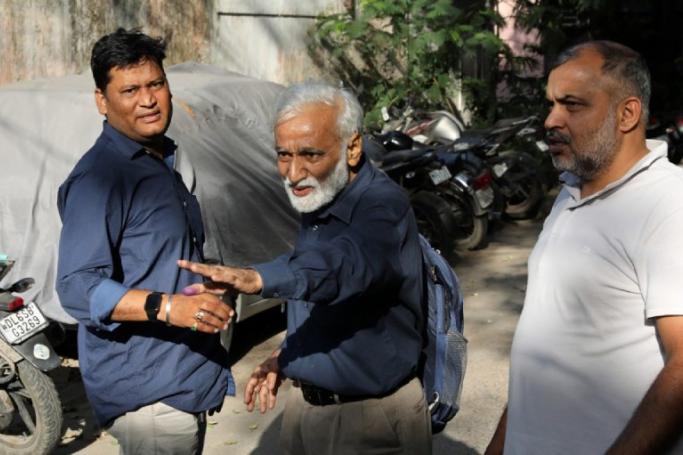Indian anti-terror police said Tuesday they had arrested two people linked to a news website and raided the homes of 44 others, in a case reportedly connected to alleged Chinese funding.
The dawn raids in the capital New Delhi have raised concern in a country where press freedom has nosedived.
Those raided are reported to be connected to NewsClick, an English-language news website that Indian authorities filed a case against in 2021 alleging it was receiving foreign funding.
The New York Times in August reported that NewsClick was financed by US millionaire Neville Roy Singham, who it said "sprinkled its coverage with Chinese government talking points" -- claims Singham rejected.
The report accused Singham of working closely with Beijing and of "financing its propaganda worldwide".
New Delhi and Beijing are bitter rivals and have a long-running border dispute, with a deadly Himalayan clash in 2020 sending diplomatic relations into a deep freeze.
- 'Intimidation' -
Police said that 37 men and nine women had been questioned, two of them while under arrest, and that "digital devices, documents etc. have been seized" for examination, without giving further details for the reason for the raid.
However, police said the raids were carried out under the Unlawful Activities Prevention Act (UAPA), a stringent anti-terror law which makes it virtually impossible to get bail.
"The proceedings are still ongoing," police said. "So far, two accused, Prabir Purkayastha and Amit Chakravarty have been arrested."
Purkayastha is the editor of NewsClick, while Chakravarty is site's head of human resources, local media reported.
NewsClick journalist Aritry Das posted on social media that police "barged into my home" at dawn, questioned her about her reporting and seized her laptop, phone and computer hard disks.
The Mumbai Press Club expressed its "deep concern" at the raids in a statement, reporting that "multiple journalists affiliated with NewsClick have been subjected to raids".
It demanded the police stop "what is perceived as a targeted harassment campaign against these journalists".
Also raided in connection to NewsClick was historian and activist Sohail Hashmi.
"From the warrant that they reluctantly showed me, the raid at my residence was related to an investigation into NewsClick," Hashmi told AFP.
Hashmi had to hand over his laptop, phone and hard disks containing more than a decade of his writing, calling the raid a "combination of intimidation and a crackdown on freedom of press and speech".
- 'Voices of dissent' -
"I don't need to justify," India's minister for information and broadcasting Anurag Thakur told reporters asking about the raids.
"If anyone has committed anything wrong, search agencies are free to carry out investigations," broadcaster NDTV quoted him as saying.
Press freedom in India has plummeted since Prime Minister Narendra Modi came to power in 2014, rights activists and opposition lawmakers say.
Reporters Without Borders warns "press freedom is in crisis" in India. Since 2014, India dropped from 140 to 161 on its rankings of media freedom, including 11 places since last year.
Journalists critical of the government complain of increased harassment, including on social media -- where Modi's ruling party has a powerful presence.
Critics say Modi's government has sought to pressure rights groups by heavily scrutinising their finances and clamping down on foreign funding.
The Network of Women in Media in India said Tuesday's "shocking" raids had targeted "prominent voices of dissent".
On Tuesday evening, journalist Abhisar Sharma said he was back home after a "day-long interrogation" by police.
"I will keep questioning people in power and particularly those who are afraid of simple questions," he wrote on social media.












